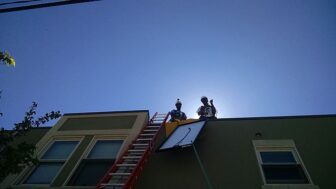Cross-posted from: here
There is a very well written column in the Diamondback by a member of UMD for Clean Energy Jesse Yurow, who is also our Outreach Director. Jesse does a good job of explaining how we can’t only rely on the top down approach to make our society more sustainable, but we need to take charge at the community level. The group Jesse alludes to working with the City Council to develop a energy efficiency loan fund policy, is of course..us.
Guest column: Climate, Kyoto and council
Twelve years ago, world leaders signed the Kyoto Protocol, a global treaty that promised to develop strategies to mitigate the perils of global climate change. Epic fail. Without mechanisms of accountability and without the support of Earth’s largest polluter, the United States, the concentration of carbon dioxide in the atmosphere has skyrocketed to about 380 parts per million and is still rising. NASA climatologist James Hansen suggests that, in order to avoid ecological catastrophe, concentrations of carbon dioxide must be reduced and held steady at 350 parts per million (see www.350.org). People sit with their fingers crossed, awaiting climate change solutions to be handed down at the next global summit on climate change this December in Copenhagen.
The United States may be able to redeem itself from the ghosts of Kyoto past and earn bargaining power on the world stage by committing to carbon emissions reductions before December. The House of Representatives passed the American Clean Energy and Security Act last June. Sen. John Kerry (D-Mass.) recently introduced the Senate version: the Clean Energy Jobs and American Power Act. However, coal and oil lobbyists are sure to grease up this bill just as they have the House version.
In spite of the difficulties of top-down change, communities working together will bring about the clean energy revolution. In College Park, creative ideas generated by students are already taking hold. Two weeks ago, the College Park City Council held a work session to discuss the possibility of implementing an energy-efficiency loan fund to finance efficiency upgrades for College Park residents. This idea was suggested to the city council by a student group along with a list of several other policies which would save the city money while cutting carbon emissions.
The city council is working with a student group to develop policy? This surely is a historic moment. But it shouldn’t be. Students working with the city to make College Park a better place should be standard operating procedure. However, students have never represented a large voting block in a city council election, so the city council has never had a reason to listen to students. With an election on Nov. 3, we have a unique opportunity to change our relationship with the city council by voting en masse and engaging the council. In order to vote in council elections, one must register to vote in College Park. The deadline for registration is today at 5 p.m. You can find voter registration forms in the Student Government Association office in the Student Involvement Suite in Stamp Student Union.
The standard recommendations for “green living,” changing to compact fluorescent light bulbs, driving less and using “eco-friendly” products, illustrate the immense disproportion between the magnitude of the problem and the puniness of the changes we are being asked to make. We need to stop trying to be less bad and start trying to be good. Through direct action and engagement with elected officials on a local level, we can empower the communities we live in to implement innovative and far-reaching solutions to climate change.





